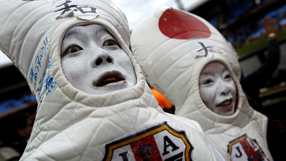Sad ending should not cloud Japan progress
PRETORIA - Japan's most successful World Cup on foreign soil ended in a second-round penalty shootout defeat by Paraguay although that disappointing end for the Blue Samurai should not mask what has been a positive tournament.

Had the shootout gone their way, Japan would have reached the last eight for the first time ever and it says much about the changed status of the Asian game that few would have been overly surprised by such an outcome.
"It's a shame we've lost a game like this, because we worked really hard to reach the last 16 and we were on the verge of making history," said captain Makoto Hasebe.
"Despite the defeat, we've shown the world just what Japanese football is about. Of course, I'm disappointed about the result but I'm very proud of our team, which stuck together in the face of every challenge," he said.
The Japanese have only once previously made it out of the group stage - eight years ago when they co-hosted the tournament with South Korea - and their displays in South Africa illustrate the continued progress they are making.
Four years ago, Japan lost 3-1 to Australia, 4-1 to Brazil and picked up their solitary point in the group stage with a goalless draw against Croatia.
Those results in Germany led many to question whether Japan really were pushing themselves into world football's elite but those doubters have been answered by the displays of Takeshi Okada's team this time around.
FLOWING FOOTBALL
Get FourFourTwo Newsletter
The best features, fun and footballing quizzes, straight to your inbox every week.
Samuel Eto'o's Cameroon were beaten 1-0 before Japan lost by the same scoreline to Netherlands and then secured a place in the last 16 with an excellent 3-1 victory over Denmark.
The manner of the win over the Danes was impressive with flowing, attacking football, a strong physical presence in midfield and at the back Japan showed they had cast off their reputation as lightweights with nice touches but no steel.
Hasebe and Daisuke Matsui were dangerous bursting forward from the flanks in that game but less effective, in an attacking sense, in more central roles against Paraguay in a match Japan lost 5-3 on penalties following a 0-0 draw after extra time.
Yasuhito Endo, the 2009 Asian Footballer of the Year, again showed himself to be a fine midfield organiser but most of the plaudits went to stylish forward Keisuke Honda.
He may have benefitted from playing off a more traditional central striker, particularly in tight games like the stalemate with Paraguay, but he made the most of his opportunities.
His superb, dipping freekick opened the scoring against the Danes and then he produced one of the 'skill spots' of the tournament with his turn, dribble and pass to set up Shinji Okazaki for the third.
If Japan had produced the same spirited attacks and creative moves against Paraguay instead of retreating into the negativity that left them facing a shootout they may have forced their way into the quarter-finals instead of leaving in tears.
Japan are one of the few emerging football nations who do not have most of their players in Europe but with the J-League making steady progress and the country producing interesting new talent, longer runs in future tournaments are on the cards.
Follow FFT.com on
